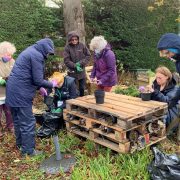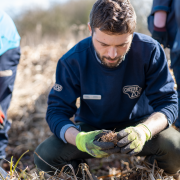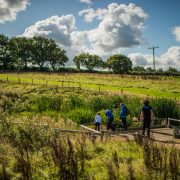Our Science Director, Simon Dowell, shares our thoughts on how conservation zoos can support the UK Government to reach its 15-minute access to nature target.
In December, the UK Government belatedly announced its legally binding environmental targets set under the conditions of the Environment Act, giving an indication of how the UK would work towards its contribution to the Post-2020 Global Biodiversity Framework (GBF). Unfortunately, despite an overwhelming call for greater ambition from over 90% of consultation respondents – including Chester Zoo – the final targets barely changed, and some seemed weaker than the original. In particular, we were disappointed that targets on species recovery and on improving water quality, both issues we continue to campaign on, were weak and unambitious.
We waited in anticipation for the Government to set out how it would meet these targets, and therefore the obligations under the GBF. This came last week in the form of the Environmental Improvement Plan (EIP).
At a time when our nature is in a critical condition, we welcome the publication of the EIP which provides several short-term goals that the Government hopes will drive progress towards their long-term targets.
“While the EIP is a step in the right direction and provides further clarity on several policy commitments, we continue to believe that our biodiversity crisis requires greater ambition. Work to reverse our drastically declining biodiversity should start right away and targets should consider the expectation that wildlife will continue to decline for the rest of the decade.”
Dr Simon Dowell, Science Director at Chester Zoo
Within the plan, we’re excited to see the commitment to bring access to green or blue spaces within a 15 minute walk of everyone’s homes, whether that be through zoological gardens or nature reserves such as ours, or parks, canals, rivers, countryside, or coasts.
Having access to nature has significant wellbeing benefits. It can improve both our mental and physical health, reduce stress levels, and be beneficial for our social relationships. Because of this, it is vital that the Government remains committed to their pledge, ensuring it is underpinned by proper resources and increased financial support.
We believe that local communities hold the key to fulfilling this commitment. At Chester Zoo, we have supported a number of projects within our 10-mile Nature Recovery Corridor – financed by the Government’s Green Recovery Challenge Fund – which have allowed local communities to connect with, support, and improve their natural environment. We’d like to see the Government enabling projects like this across the UK, backed financially by businesses, and allowing local people to take ownership of local nature restoration, supported by environmental NGOs and voluntary groups to make it happen.
OUR NATURE RECOVERY CORRIDOR PROJECT IS ALL ABOUT MAKING LARGE SCALE LANDSCAPE CONSERVATION IN THE UK A REALITY.
We’re pleased that the plan re-committed to several long-awaited policies that we believe will have a significantly positive effect on our natural world. For example, the introduction of the due diligence secondary legislation which will tackle illegal deforestation in UK supply chains, the establishment of a Natural History GCSE, and the rolling out of Local Nature Recovery Strategies.
Finally, we’re encouraged that the plan commits to working with experts to consider future opportunities for species reintroductions. With our vast experience and expertise, we believe there is considerable potential for conservation zoos like ours to play a key role in this work.
The Secretary of State for the Environment, Therese Coffey MP, has said that nature cannot wait any longer – we agree. That is why we must see more a more ambitious approach to nature recovery, with local communities at its heart. The success of our Nature Recovery Corridor is an excellent example of how this can work in reality, and we stand ready to assist the Government in supporting similar schemes across the North West, and further afield.
Our planet is facing its toughest challenge yet, and we’ve put together a 10 year Conservation Masterplan to help save it.



